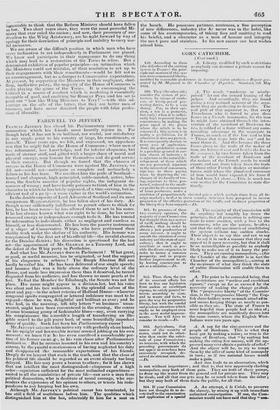FAREWELL TO JEFFREY.
FRANCIS JEFFREY has closed his Parliamentary career; a con- summation which his friends must heartily rejoice in. For
though brief, it has not been brilliant, nor useful, nor satisfactory in any single point to his country at large, his constituents, or himself. Three years ago, we felt, and expressed, an apprehen-
sion that he might fail in the House of Commons ; where men of
less refinement, less knowledge, and far inferior eloquence, but made of sterner stuff, and gifted with a larger share of moral and
physical energy, reap honour for themselves and do good service to their country. But though we feared that the chances of success in the House of Commons were against Mr. JEFFREY, we did not—could not—anticipate so complete and melancholy a failure as his has been. We recollect him the pride of Scotland— learned and eloquent, high principled, noble-minded, active, labo- rious, the fearless asserter of popular rights, the indignant de- nouncer of wrong; and have hardly patience to think of him in the character in which he has lately appeared, of a time-serving, but in- efficient tool of a pa. ty—a mere cipher in the world's estimation. In the double capacity of Lord Advocate of Scotland and its most conspicuous Representative, he has fallen short of his duty. Al- though never sufficiently' indifferent to permit others to think for him, he has been worse—he has allowed them to act in his name. If he has always known what was right to be done, he has never possessed energy or independence enough to do it. He has trusted for information to individuals either as negligent and careless as himself, or less disinterested. He has been the passive instrument of a clique of Conservative \V hilts, who have performed their shabby work under the shelter of his authority. His honour was compromised by the first act of his official life—the invalid election for the Dundee district; his discretion is questioned for the last act—the appointment of Mr. GRAHAM as a Treasury Lord, and the defeat of the Whig party in Perthshire.
And what has Mr. JEFFREY done in Parliament ? What great, or good, or useful measure, has he originated, or lent the support of his eloquence to achieve ? The Burgh Election Bill can hardly be called his. He has been delivered of one single speech; and because that was a little above the ordinary level of the House, and made less impression there than it deserved, he turned disgusted from his audience, and has thrown no more pearls at its feet. To find the Member for Edinburgh, the Senate was not the place. His name might appear in a division-list, but his voice was silent and his face unknown. In the splendid salons of the great and gay—in the select coteries of Holland House—wherever congenial spirits congregated or lettered indolence was most to be enjoyed—there be was, delightful and brilliant as ever; and he who had, in the morning, left fifty letters "on business" unan- swered, might have been encountered in the evening, the centre of some blooming group of fashionable blues—nay, even carrying his complaisance the iticredib'e length of transferring an ille- gible scrawl to the gilt paper book of some beautifully impudent dame of quality. Such has been his Parliamentary career ! Mr. JEFFREY Ictut ns to his native city with perfectly clean hands, for his upright and honourable nature scorned jobbing on his own account : we learn 11at h.3 has even sacrificed a considerable por- tion of his former eainittg4, in his vain chase after Parliamentary distinctim. But he returns lessened in his own and his country's esteem, by the painful consciousness of having neglected his duty and disappointed the reasonable expectations of his friends. Deeply do we lament that such is the truth, and that the close of Ms political life should be regarded as an event already too long delayed. His fate may prove a beacon to others ; for it has shown that not intellect the most distinguished—eloquence of a high order—reputation sufficient for the most unlimited expenditure— united to all the amiabilities of private life—can save a man from political damnation, who is destitute of moral courage, who sur- renders the expression of his opinion to others, or trusts his inde- pendence to any keeping but his own. Although Mr. JEFFREY'S political career has terminated, he has still a field of usefulness before him. The qualities which distinguished him at the bar, admirably fit him for a seat on the bench. He possesses patience, acuteness, a fine perception of nice differences, industry (for he never was in the habit, like some of his contemporaries, of taking fees and omitting to read his briefs), and a character as a man of honour and integrity the most pure and stainless. In his new career our best wishes attend hint.




















 Previous page
Previous page